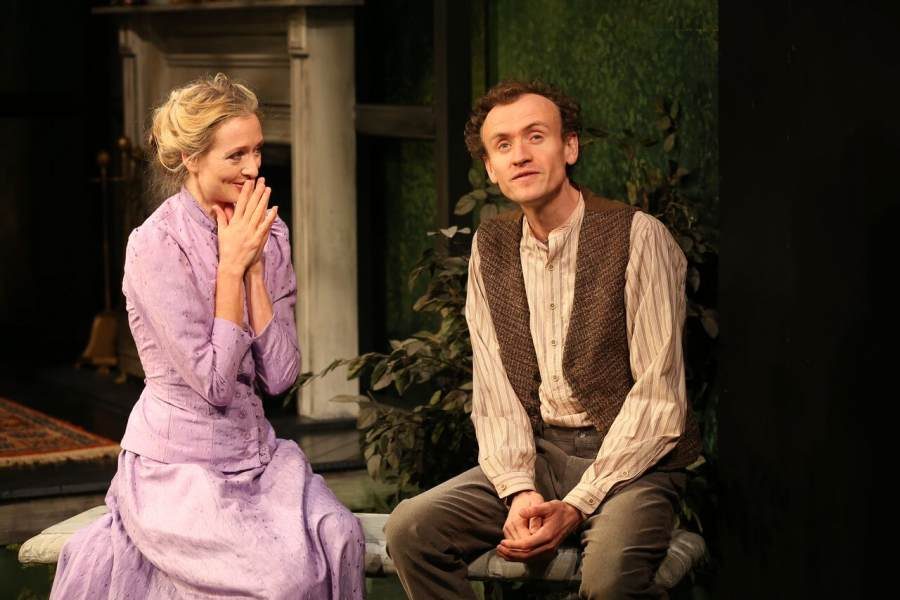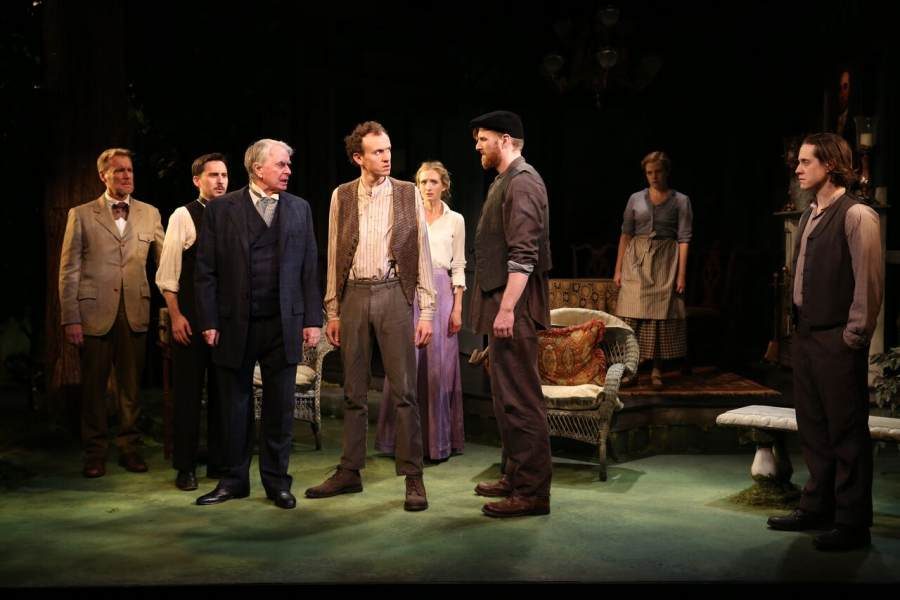

Set in Donegal, Ireland in 1878, Brian Friel's The Home Place (at Irish Repertory Theatre) dramatizes the racial tension between the native Irish and the ruling English. It also depicts the tension between Christopher Gore and his son David, who are both madly in love with their housekeeper Margaret O'Donnell. Meanwhile, Christopher's cousin brings yet another layer of tension to the scene when he arrives to measure the local Irish's heads for his Darwinian experiments. We spoke with Ed Malone, who plays David Gore, about the nuances of Friel's subtle drama, how theatrical clowning helps him get in touch with his character, and what the word "home" means for both David and Ed.
The Home Place obviously has the word “home” in the title, and each character in the play seems to seems to have a different idea of what that word means. What do you think home means for your character, David Gore?
Wow, great question. I think my character, David Gore, really hasn’t found his home yet, because he’s so in love with Margaret, the housekeeper. And he’s constantly dreaming of running away: taking her away to Glasgow and Scotland, and taking her away to Africa, Kenya. I don’t think he considers the home place in Donegal where he’s grown up to be his home. He’s English, but he came over to Ireland at a young age. So really I would say my character David Gore hasn’t really found his home place, and he wants to discover it with Margaret, the woman he’s in love with. That’s his dream, that’s his hope; that’s what he’s aspiring to do.
Yeah, that’s kind of what I got, too.
And it’s wonderful the way Brian Friel has written it: the ambiguity and the contradictions, people trying to figure out where their home place is and what that means to them. So it’s a great question, because I think there’s no definite answer to that question, necessarily.
You yourself are an Irish-born artist who moved to New York. Are there any themes in The Home Place that resonate with you personally?
Well, sure. I moved to America ten years ago, to New York City. And absolutely, I guess, well with David, just to make it about my character: this kind of desire that David has to get away – I had that. I mean, don’t get me wrong, I love Ireland. I grew up in Cork City in the south of Ireland, and it’s a great city, great country. But I always did dream about moving away as a young artist from Ireland. It’s the nature of the country. There are some amazing artists living and working there, but it’s a smaller country, obviously, and I dreamed about coming to New York and tracing my dreams over here, which I’m doing right now, I guess. It wasn’t an easy decision for me to leave Ireland. It’s one thing to want something, but to make it happen, and when you weigh it all up, leaving family and friends behind and whatever, it’s not an easy decision to make. So yeah, I do totally relate to that aspect of things, for sure.

You’ve done a few solo plays, too. Would you say it’s harder to pull off a solo show than it is to pull off a show like The Home Place, with a full cast? Or the other way around?
That's a great question, and I would say that they're both equally challenging. People would assume that a one-man show is more difficult and in some ways it is. But the great thing about a one-man show: you don’t have any responsibility to anybody else. You can be onstage and you can mess up, whatever, you deal with the mess yourself. But when you’re in an ensemble piece like this, The Home Place is written so specifically that if you mess up a line or a moment, it can throw other actors off. So it requires a really high level of concentration to devote yourself to the ensemble and tell a story. So there’s different challenges in the one-man show and in the ensemble piece. Yes, when you’re doing a one-man show for an hour, or an hour and a half or whatever, it’s very intense, you’ve got no one to help you out; you’ve got to do it all yourself. But that can be a lot of fun. Physically it can be a bit more challenging, I guess, doing a one-man show. But mentally, I think doing The Home Place is more challenging because it’s so specific and it’s written in a way that’s almost Chekhovian. And there’s so much subtext going on that that can be very mentally demanding: the fact that you have to relay a lot of information to the audience in a kind of a subtle, nuanced manner. That’s not easy.
I have a very physical theatre background. I trained with , who’s a very famous French clown acting teacher. But it’s a very specific kind of thing that’s more related to creating your own work. So it’s wonderful to be able to bring those kind of techniques into a beautiful script like Brian Friel’s script: more kind of clown-like techniques – that I can sometimes use in the things that I’m in in The Home Place, especially in the first scene that I’m in with Margaret where I’m madly in love with her. I think that that’s a very comedic scene, and I can really get in touch with my clown training for those kinds of things.
I did want to ask a little bit about clowning, because you teach theatrical clowning classes, right?
I do, yes, that’s correct.
I think a lot of people probably don’t know exactly what that is. Could you talk a little bit about what you teach and how you go about it?
It’s really funny, whenever people ask me about this I find it hard to explain. But what I will say, just to make a strong distinction between one thing that can confuse people: theatrical clown is not circus clown. It’s not about training for the circus, and I actually do very little work with costumes and red noses. My training is more about helping the performer to tell the story physically, and verbally in a very specific way, but really making them aware that every gesture they make physically can tell a story and just making them really aware of their bodies and how important it is. Because sometimes when we act, we forget that every part of our body needs to be engaged to relay the story to the audience. It’s not just about standing on a stage and talking. Acting is a very physical thing. The theatrical clown work is very vulnerable work, it’s about innocence and really stripping you down to just getting you in touch with that inner child again and being very playful. And so I play a lot of fun, childlike exercises to get people in touch with that inner child again. And a lot of my techniques are a variation of the work I did with Philippe Gaulier in Paris. It’s not easy to describe and you really kind of have to be in a class to experience it. But really, it is just about getting you in touch with your inner child in a playful way. And it’s making you realize that anybody can be a clown, you know. You don’t need a red nose and funny makeup to be a clown. It’s in us all. That’s my philosophy.
Do you have any plans after The Home Place?
Well, speaking of clowns, I’m very excited about next March, I will be working with – I don’t know if I’m allowed to say this yet actually, but I’ll say it – a wonderful theatre company in New York City called Theatre for a New Audience will be doing a production of The Winter’s Tale.
Oooh.
Shakespeare’s beautiful play, of course. Which will run from next March through next April. It will be directed by Arin Arbus who just recently won the Obie Award for Best Director. And I will be playing the clown in that production! So I’m excited about that.
What have you enjoyed most about this production of The Home Place?
You know, I’d have to say I’ve enjoyed it from the first day of rehearsal, because Charlotte Moore, the director, I’ve worked with her before on Juno and the Paycock about three or four years ago. And she just gets better and better with age, to be honest with you. And I think she did an amazing job in casting this play because everyone in the cast just is really right for the role and it’s a wonderful ensemble of actors. This play has never been done in New York City, so we all became quickly very passionate about it, and we really wanted to do a good job with it. And on a personal note, playing an English guy, doing an English accent in the play has been fun for me. And to play such a romantic character has been great, because I can be quite romantic in real life, too. I relate to a lot of David’s character traits. When I fall in love with someone I’m not very grounded about it, and I think David’s the same: he’s kind of head over heels in love with Margaret, and he’s kind of unrealistic in a lot of his dreams but he commits to them fully and he really believes in them. He’s such a lovable, charming young man. But his feet really aren’t on the ground and ultimately, not to give a spoiler to your readers, but ultimately that kind of hurts him. He’s just so carried away with something that Margaret says in the first act when it appears that she’s agreeing to his love, where she’s saying that she shares the same feelings, and in Act II things don’t go as he hoped and dreamed. And maybe if he’d approached things in a more grounded manner that might not have happened. But he just got carried away, and I totally relate to that as a human being. I think that’s a very Irish thing, even though I’m playing an English character, I think it’s a very Irish thing to do: very romantic and too romantic perhaps, if that’s possible. So I really enjoyed tapping into that side of myself.